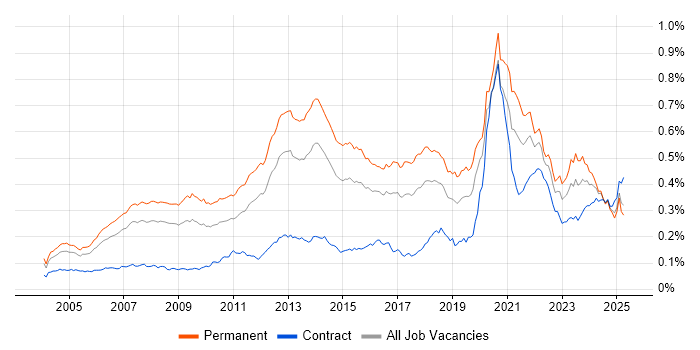Software Engineer/Developer
UK
The median Software Engineer/Developer salary in the UK is £135,000 per year, according to job vacancies posted during the 6 months leading to 5 March 2026.
The table below compares current salary benchmarking and summary statistics with the previous two years.
|
|
6 months to
5 Mar 2026 |
Same period 2025 |
Same period 2024 |
| Rank |
602 |
496 |
516 |
| Rank change year-on-year |
-106 |
+20 |
+175 |
| Permanent jobs requiring a Developer/Software Engineer |
74 |
174 |
317 |
| As % of all permanent jobs in the UK |
0.10% |
0.38% |
0.40% |
| As % of the Job Titles category |
0.11% |
0.42% |
0.43% |
| Number of salaries quoted |
69 |
167 |
261 |
| 10th Percentile |
£60,000 |
£71,250 |
£65,000 |
| 25th Percentile |
£100,000 |
£80,000 |
£87,500 |
| Median annual salary (50th Percentile) |
£135,000 |
£102,500 |
£110,000 |
| Median % change year-on-year |
+31.71% |
-6.82% |
+25.71% |
| 75th Percentile |
£142,500 |
£115,000 |
£142,500 |
| 90th Percentile |
£150,000 |
£138,750 |
£153,750 |
| UK excluding London median annual salary |
£60,000 |
£60,000 |
£55,000 |
| % change year-on-year |
- |
+9.09% |
+10.00% |
For comparison with the information above, the following table provides summary statistics for all permanent IT job vacancies. Most job vacancies include a discernible job title that can be normalized. As such, the figures in the second row provide an indication of the number of permanent jobs in our overall sample.
| Permanent vacancies in the UK with a recognized job title |
65,777 |
41,647 |
74,342 |
| % of permanent jobs with a recognized job title |
91.60% |
91.11% |
94.66% |
| Number of salaries quoted |
41,594 |
22,804 |
57,442 |
| 10th Percentile |
£29,750 |
£32,500 |
£28,500 |
| 25th Percentile |
£38,250 |
£45,000 |
£39,073 |
| Median annual salary (50th Percentile) |
£55,000 |
£60,000 |
£55,000 |
| Median % change year-on-year |
-8.33% |
+9.09% |
-8.33% |
| 75th Percentile |
£75,000 |
£80,000 |
£72,624 |
| 90th Percentile |
£95,000 |
£100,000 |
£92,500 |
| UK excluding London median annual salary |
£50,000 |
£55,000 |
£50,000 |
| % change year-on-year |
-9.09% |
+10.00% |
-5.66% |
Developer/Software Engineer
Job Vacancy Trend
Historical trend showing the proportion of permanent IT job postings featuring 'Developer/Software Engineer' in the job title relative to all permanent IT jobs advertised.
Developer/Software Engineer
Salary Trend
Salary distribution trend for Developer/Software Engineer job vacancies in the UK.
Developer/Software Engineer
Salary Histogram
Salary distribution for jobs citing Developer/Software Engineer over the 6 months to 5 March 2026.
Developer/Software Engineer
Top 9 Job Locations
The table below looks at the demand and provides a guide to the median salaries quoted in IT jobs citing Developer/Software Engineer within the UK over the 6 months to 5 March 2026. The 'Rank Change' column provides an indication of the change in demand within each location based on the same 6 month period last year.
Developer/Software Engineer Skill Set
Top 30 Co-Occurring Skills & Capabilities
For the 6 months to 5 March 2026, Developer/Software Engineer job roles required the following skills and capabilities in order of popularity.
The figures indicate the absolute number of co-occurrences and as a proportion of all permanent job ads featuring Developer/Software Engineer in the job title.
Developer/Software Engineer Skill Set
Co-Occurring Skills & Capabilities by Category
The following tables expand on the one above by listing co-occurrences grouped by category. They cover the same employment type, locality and period, with up to 20 co-occurrences shown in each category:


